将来完成时与将来进行时
将来进行时-将来完成时--将来完成进行时
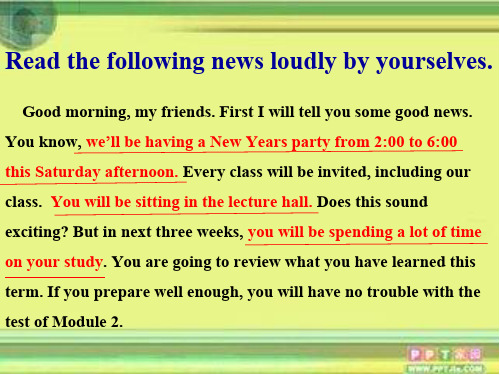
将来进行时也可以与一般将来时换用,但有 细微差别:
﹛I won’t see him while I’m in Shanghai. 在上海时我不会去看他 I won’t be seeing him while I’m in Shanghai. 在上海时我不会见到他
﹛Won’t you come with us ?你不想和我们一起 去吗?(邀请) Won’t you be coming with us ?你不和我们一 起去吗?(单纯谈事实)
• The train will have left when we get to the station.
经常与before+将来时间或by+将来时间连 用,也可与before或by the time引导的现在 时的从句连用。
1.We shall have learned 12 units by the end of this term.
将来进行时
将来进行时的构成
陈述句中:shall/will+be+V-ing 否定句中:shall/will not be+V-ing 一般疑问句:Shall/Will+主语+be+doing? 特殊疑问句:特殊疑问+will/shall+be+doing?
将来进行时的用法
1. What will you be doing on Saturday? 2. This is tomorrow we'll be sitting in the cinema and watching a film.
一般将来时与将来进行时区别:
(a) We’ll fly to Morocco, in northern Africa soon.
英语语法之将来进行时和将来完成时
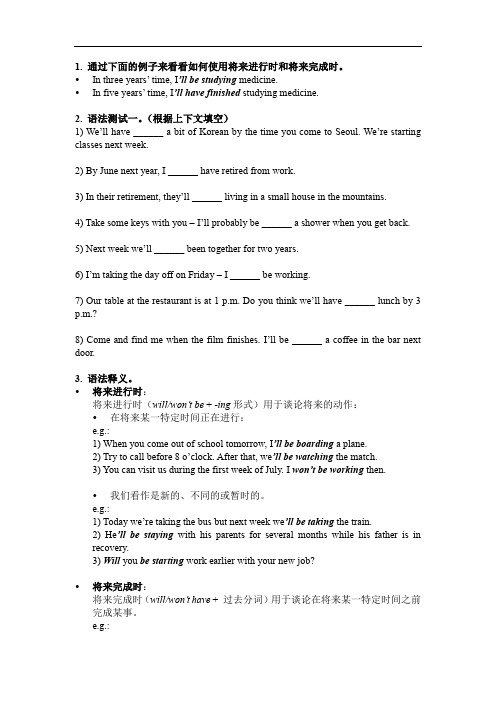
1. 通过下面的例子来看看如何使用将来进行时和将来完成时。
•In three years’ time, I’ll be studying medicine.•In five years’ time, I’ll have finished studying medicine.2. 语法测试一。
(根据上下文填空)1) We’ll have ______ a bit of Korean by the time you come to Seoul. We’re starting classes next week.2) By June next year, I ______ have retired from work.3) In their retirement, they’ll ______ living in a small house in the mountains.4) Take some keys with you – I’ll probably be ______ a shower when you get back.5) Next week we’ll ______ been together for two years.6) I’m taking the day off on Friday – I ______ be working.7) Our table at the restaurant is at 1 p.m. Do you think we’ll have ______ lunch by 3 p.m.?8) Come and find me when the film finishes. I’ll be ______ a coffee in the bar next door.3. 语法释义。
•将来进行时:将来进行时(will/won’t be + -ing形式)用于谈论将来的动作:•在将来某一特定时间正在进行:e.g.:1) When you come out of school tomorrow, I’ll be boarding a plane.2) Try to call before 8 o’clock. After that, we’ll be watching the match.3) You can visit us during the first week of July. I won’t be working then.•我们看作是新的、不同的或暂时的。
将来完成时态和将来进行时

Discovery2
BBy ythe y到ea…r 2为01止5
now
2015
time
produce new types of clothes
future
By the end of the century, we will have produced new types of clothes.
Summary2
常与将来完成时连用的时间状语有:
1.“before+将来时间”或“by+将来时间” 2. by the time +从句(一般现在时) 3. when +从句(一般现在时)
两个新学时态的比较: We will still be working this time tomorrow. We will have arrived there by 10 o’clock tomorrow.
Practice2
by the time you are back this evening
time finish alflutthuerework
I will have finished all the work by the time you are back this evening. 时间状语: by the time + 从句(一般现在时)
.
Discovery1
Listen to Professor Willard
time past now at 9 a将.m来. 某thi个s S特at定ur的da时y 间
At 9 a.m. this Saturday I will be listening to Professor Willard.
结构: will have done
新概念语法 将来完成时将来进行时将来完成进行时
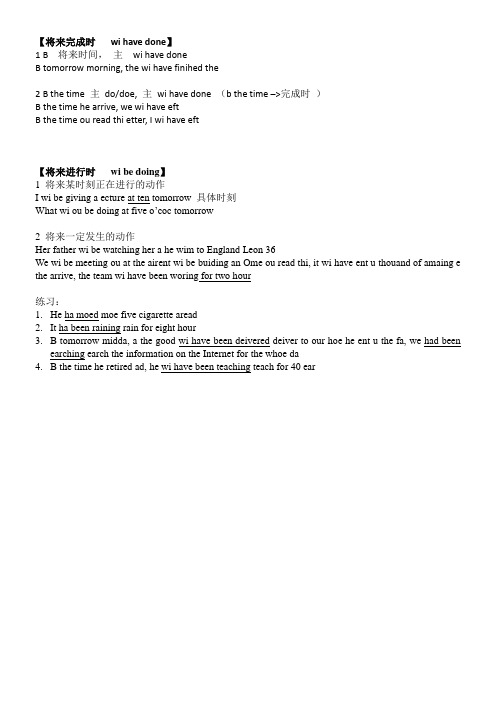
【将来完成时wi have done】1 B 将来时间,主wi have doneB tomorrow morning, the wi have finihed the2 B the time 主do/doe, 主wi have done (b the time –>完成时)B the time he arrive, we wi have eftB the time ou read thi etter, I wi have eft【将来进行时wi be doing】1 将来某时刻正在进行的动作I wi be giving a ecture at ten tomorrow 具体时刻What wi ou be doing at five o’coc tomorrow2 将来一定发生的动作Her father wi be watching her a he wim to England Leon 36We wi be meeting ou at the airent wi be buiding an Ome ou read thi, it wi have ent u thouand of amaing e the arrive, the team wi have been woring for two hour练习:1.He ha moed moe five cigarette aread2.It ha been raining rain for eight hour3. B tomorrow midda, a the good wi have been deivered deiver to our hoe he ent u the fa, we had beenearching earch the information on the Internet for the whoe da4. B the time he retired ad, he wi have been teaching teach for 40 ear。
一般将来时,将来进行时,将来完成时
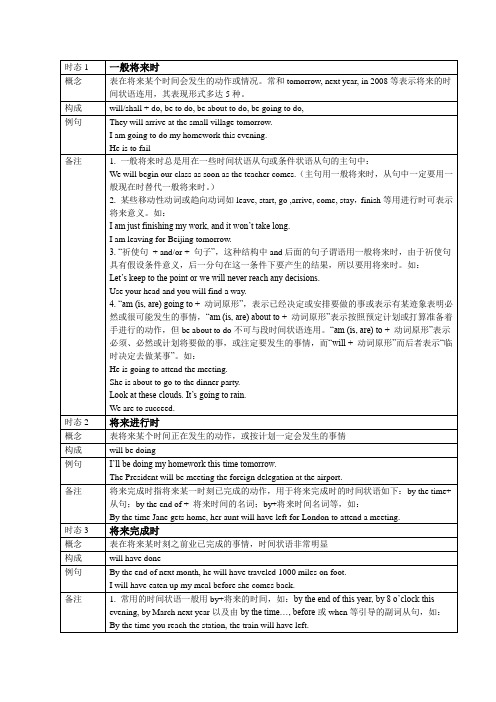
1.I won’t be able to attend the meeting tonight because____then.A. I must have a classB. I will be teaching a classC. I teach a classD. I will have taught a class2. -----Could you give these books to Mr. Black?-----Absolutely, ___ him at five this afternoon.A. I will have a talk withB. I have a talk withC. I can have a talk withD. I will be having a talk with3. I’m afraid I won’t be available then. I ___ a friend at three this afternoon.A. seeB. am seeingC. will seeD. will be seeing4. Next Friday I will go to another concert. They ____ some thing by Mozart at that time.A. playB. will be playingC. are going to playD. are to play5. -----What are you doing, Jack?-----Make a model plane. I ____ it in the science class at 10 o’clock tomorrow morning.A. will be showingB. am going to showC. showD. have showed1. 下星期这时候我们将在那个工厂劳动。
将来进行时与将来完成时
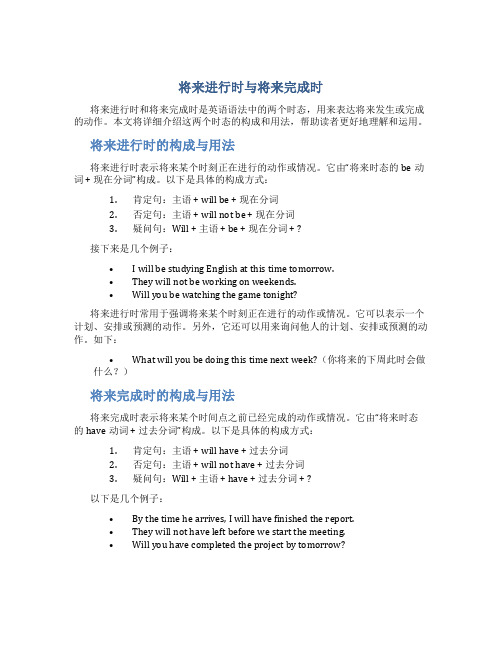
将来进行时与将来完成时将来进行时和将来完成时是英语语法中的两个时态,用来表达将来发生或完成的动作。
本文将详细介绍这两个时态的构成和用法,帮助读者更好地理解和运用。
将来进行时的构成与用法将来进行时表示将来某个时刻正在进行的动作或情况。
它由“将来时态的be动词 + 现在分词”构成。
以下是具体的构成方式:1.肯定句:主语 + will be + 现在分词2.否定句:主语 + will not be + 现在分词3.疑问句:Will + 主语 + be + 现在分词 + ?接下来是几个例子:•I will be studying English at this time tomorrow.•They will not be working on weekends.•Will you be watching the game tonight?将来进行时常用于强调将来某个时刻正在进行的动作或情况。
它可以表示一个计划、安排或预测的动作。
另外,它还可以用来询问他人的计划、安排或预测的动作。
如下:•What will you be doing this time next week?(你将来的下周此时会做什么?)将来完成时的构成与用法将来完成时表示将来某个时间点之前已经完成的动作或情况。
它由“将来时态的have动词 + 过去分词”构成。
以下是具体的构成方式:1.肯定句:主语 + will have + 过去分词2.否定句:主语 + will not have + 过去分词3.疑问句:Will + 主语 + have + 过去分词 + ?以下是几个例子:•By the time he arrives, I will have finished the report.•They will not have left before we start the meeting.•Will you have completed the project by tomorrow?将来完成时通常用于描述在将来某个时间点之前已经发生或完成的动作。
高三英语过去完成时、将来完成时、现在完成进行时、将来进行时
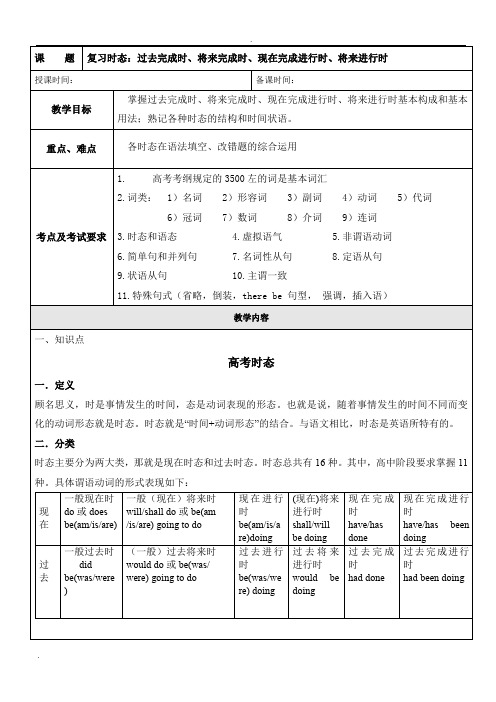
课后作业一、真题演练:单句语法1. When I die, I ____________(give) everything to you.2. That was definitely not an attractive idea, so I politely declined her invitation, .____________(close) m y book and walked away.3. His fear of failure __________(keep) him from classroom games that other students played with joyousabandon.4. _______________(speak) out your inner feeling won’t make you feel ashamed, on the contrary,5. _____________(complete) the project as planned, we’ll have to work two more hours a day.6.It was raining lightly when I___61___ (arrive) in Yangshuo just before dawn.7. This cycle 48 (go) day after day:The walls warm up during the day and cool off during the night and are thus always a timely offset(抵消) for the outside temperatures.8. In 1969,the pollution was terrible along the Cuyahoga River near Cleveland,Ohio.It 61 (be) unimaginable that it could ever be cleaned up.9. Be patient!Tai Chi 66 (call) “shadow boxing” in English.It asks you to act like water:10.Unless some extra money (find),the theatre will close11.When a new day breaks,the walls have given up their heat and are now cold enough 46 (cool) the house during the hot day;at the same time,they warm up again for the night.12. In addition to their simple beauty,what makes the adobe dwellings admirable is their ability to “air condition” a house wi thout 44 (use) electric equipment.13. The adobe dwellings(土坯房) 41 (build) by the Pueblo Indians of the American Southwest are admired by even the most modern of architects and engineers.二、单选题1. When I was young, I ________ with my grandma in the countryside, which is unforgettable.A. livedB. have livedC. was livedD. had lived2. –Excuse me, is the book Gone with the Wind by Margaret Mitchell available now?-Sorry, but it _________ so well that we don’t have any in store.A. sellsB. is soldC. has soldD. has been sold3. The tourism of Linyi _________ rapid growth over the last decade. Now it’s the second most visited city in Shandong Province.A. sawB. had seenC. is seeingD. has seen4. Great changes _____place in my hometown during the past three decades.A. tookB. have takenC. were takenD. have been taken5.Leave me alone. I ________ an article all the afternoon and haven’t finished yet.A. writeB. have been writingC. have writtenD. wrote6. When the power of love _______ the love of power, the world will likely be in peace.A. overcomesB. will overcomeC. is overcomingD. overcame7. Mr. Black ________ Shanghai in a few days. Shall we have a party?A. leavesB. is leavingC. leftD. has left8. –Look, it _________ again.–Yeah. This is the third snow we __________ this spring.A. will snow, are havingB. has snowed, had hadC. is snowing, have hadD. snows, have had9. Mr. White ____ in our school for nearly forty years before he retired last month.A. workedB. has workedC. had workedD. would work10. The project ________ to developing the economy and reducing poverty when it is completed.A. has contributedB. had been contributedC. will contributeD. is contributed11. Nelson Mandela __________ peacefully at his Johannesburg home on Thursday, President Jacob Zuma said.A. diesB. diedC. has diedD. was died12. –I thought you _____________ for vacation tomorrow.-I had planned, but I have a very important meeting to attend tomorrow.A. will leaveB. are leavingC. have leftD. were leaving13. Our manager ________for Shanghai in a few days and he has asked me to find out when the earliest plane ________ next Wednesday.A. is leaving, takes offB. will leave, is taking offC. leaves, will take offD. is to leave, is going to take off14. I’m calling about the apartment you ______the other day .Could you tell me more about it?A .advertised B. had advertised C. were advertising D. will advertise15. Whenever you______a present, you should think about it from the receiver’s point of view.A. boughtB. have boughtC. will buyD. buy16. I walked slowly through the market, where people ______ all kinds of fruits and vegetables. I studied the prices carefully and bought what I needed.A. sellB. were sellingC. had soldD. have sold17. The twins, who _______ their homework, were allowed to play badminton on the playground.A. will finishB. finishC. have finishedD. had finished18. The journey was tiring! All the seats in the train _______. I had to stand all the way.A. were occupiedB. would be occupiedC. would occupyD. had occupied19. Yesterday afternoon, I ______my homework when Mary called.A. had doneB. was doingC. would doD. am doing20. Close the door of fear behind you, and you ______ the door of faith open before you.A. sawB. have seenC. will seeD. are seeing21. Tommy is planning to buy a car. By next month ,he____ enough for a used one.A. saves B .saved C. will save D. will have saved22. She was surprised to find the fridge empty; the child _____ everything!A. had been eatingB. had eatenC. have eatenD. have been eating23. Despite the previous rounds of talks, no agreement______ so far by the two sides.A. has been reachedB. was reachedC. will reachD. will have reached24. More expressways _______in Sichuan soon to promote the local economy.A. are being builtB. will be builtC. have been builtD. had been built25 After school we went to the reading-room to do some reading, only to be told that it _____.A. was decoratedB. had decoratedC. had been decoratingD. was being decorated三、语法填空(共10小题;每小题1.5分,满分15分)阅读下面短文,在空白处填入1个适当的单词或括号内单词的正确形式。
将来完成时与将来进行时

将来完成时与将来进⾏时将来完成时与将来进⾏时Please do the exercise and try to figure out the tense which is different from the tenses we learnt1. By the end of this year ,I ____enough money for a holiday.A will saveB will be savingC will have savedD have saved2. I have been studying here for four years, by next summerA shall graduateB shall be graduatedC shall be graduatingD shall have graduated3. I hope her health _______greatly by the time we come back next yearA improvesB improvedC will be improvedD will have improve4.Don't phone me between 8:00 and 10:00. We_________ classes then.A. will be havingB. are havingC.had.D.have5. I think that she_______ on this experiment until next morningA. will have workedB. will be workingC. workD. are working总结将来完成时讲义定义将来完成时⽤来表⽰在将来某⼀时间以前已经完成或⼀直持续的动作。
经常与before+将来时间或by+将来时间连⽤,也可与before或by the time引导的现在时的从句连⽤。
最新将来完成时-将来进行时

表示说话人对某一已经完成动作 的推测。
The students will have finished reading the article now.
I think he will have got home so far.
4. people (eat) _w_i_l_l _b_e_e_a_t_in_g_ only food created by specialists
5. traditional farms (disappear) _w_i_ll_h_a_v_e__d_is_a_p_p_e_a_r_e_d_
6. many new galaxies (discover) _w_i_ll_h__a_v_e_b_e_e_n_d__is_c_o_v_e_re_d_
Turn to page 66 and do exercise 2
2. will have spent 3. will have become 4. will have invested 5. will have been 6. will have died
2. By the end of this decade he will have a treatment that can cure all kinds of cancer. 3. By the time he’s thirty-five he will have become a professor. 4. By the end of his career he will have received several honorary doctorates from famous universities. 5. By the end of next year he will have finished writing his PHD paper. 6. By 2010 he will have written a book about epidemics. 7. By next summer he will have been to fifteen conferences. 8. By 2015 he will have done a lot of research on cancer.
将来完成时态和将来进行时用法范例

将来完成时表示在将来某一时间之前己完成的动作,并且往往对将来某一时间产生影响。
将来完成时的谓语由。
shall/will+have+过去分词"构成。
will用于第一、二、三人称主语,shall用于第一人称主语。
主语是第一人称时,sha日常被will所代替。
如By this summer Ifive years.Tom will have had his exam by December 18.将来完成时有时可与ever,never,soon等时间状语连用。
如Will they ever have done with their talking?将来完成时往往可与时间或条件状语从甸连用。
如The train will have left when we get to the sta-tion.If you come at sevenhave finished dinner yet.二、将来进行时将来进行时的基本用法是表示在将来某个特定的时间内正在进行的动作,常表示已安排好的事或预计会发生的事,给人一种期待之感。
将来进行时的谓语由。
shall/will+be+动词-ing形式"构成。
如This time tomorrow, we' 11 be sitting in thecinema and watching a film.On Samday mon]ing, Bill will be working inthe garden and Ann will be shopping.将来进行时还有F列用法女将来进行时常表示事情的正常发展,是由客观情况决定的。
如-Would it be any trouble for you to post this1 euer? ·-No. Not at all. I shall be going out presently.shall/will have been here foro' clock, 1 shall not将来进行时可以表示原因、结果和可能。
将来进行时 将来完成时 将来完成进行时讲解学习
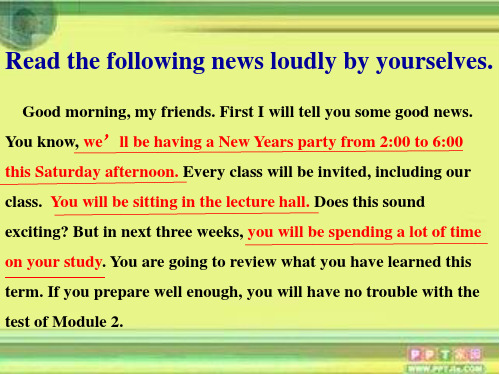
将来进行时
将来进行时的构成
陈述句中:shall/will+be+V-ing 否定句中:shall/will not be+V-ing 一般疑问句:Shall/Will+主语+be+doing? 特殊疑问句:特殊疑问+will/shall+be+doing?
将来进行时的用法
1. What will you be doing on Saturday? 2. This is tomorrow we'll be sitting in the cinema and watching a film.
一般将来时与将来进行时区别:
(a) We’ll fly to Morocco, in northern Africa soon. (b) We’ll be flying to Morocco, in northern Africa on Friday evening.
一般将来时与将来进行时区别之一:
we usually go to at weekends. (shop)
3.用于口语,有时可以和现在进行时换用:
1.I am meeting her tomorrow evening. (be going表将来)
2.I ’ll be meeting her tomorrow evening. (将来进行时)
将来进行时也可以与一般将来时换用,但有 细微差别:
﹛I won’t see him while I’m in Shanghai. 在上海时我不会去看他 I won’t be seeing him while I’m in Shanghai. 在上海时我不会见到他
﹛Won’t you come with us ?你不想和我们一起 去吗?(邀请) Won’t you be coming with us ?你不和我们一 起去吗?(单纯谈事实)
五种一般将来时的表达

五种一般将来时的表达一般将来时可以用来描述未来发生的动作或情况,并可以将这类表达方式分为五种:将来现在时、将来进行时、将来完成时、将来完成进行时和将来将要做/将要发生的事。
首先,将来现在时用来表达将来发生的某件事情,其基本结构为“will/shall+动词原形”,如:“I will go to school tomorrow.”(明天我将去上学)。
将来现在时可以被用来表达一种安排或计划,也可以表达某一决定,甚至可以表达推测或猜测。
其次,将来进行时语法结构为“will/shall+be+动词现在分词”,如:“I will be studying at home tonight.”(今晚我将在家学习)。
将来进行时可以被用来表达将来发生的动作,也就是将来打算发生或正在发生的某项活动。
第三,将来完成时,它的结构为“will/shall+have+动词过去分词”,如:“I will have finished my work by Friday.”(到星期五的时候,我将已完成我的工作)。
将来完成时可以用来表达将要发生的某件事在未来将要发生的某一时刻之前已经完成或发生的情况。
第四,将来完成进行时,其结构为“will/shall+have been+动词进行时”,如:“By the time I finish school, I will have been studying English for five years.”(当我完成学校教育的时候,我将已经学习英语5年了)。
将来完成进行时可以用来表达某个动作将要在将来某个时刻发生之前已经发生了一段时间。
最后,将来将要做/将要发生的事,它的结构为“be going to+动词原形”,如:“I am going to buy a new car next month.”(下个月我将去买一辆新车)。
将来将要做/将要发生的事可以用来表达将要发生的某件事,这类表达方式表明了某件事正在发生,或正在准备发生。
将来时句型的结构

将来时句型的结构
将来时是英语中表示将来发生的动作或事件的一种时态。
在将来时中,常用的句型有以下几种结构:
1. 将来进行时:will be + 现在分词
例如:I will be studying for my exams tomorrow.
2. 将来一般时:will + 动词原形
例如:I will call you later.
3. 将来完成时:will have + 过去分词
例如:By next year, I will have graduated from university.
4. be going to + 动词原形:表示打算或计划要做某事
例如:I am going to visit my friend in New York next month.
5. be about to + 动词原形:表示即将要做某事
例如:I am about to leave for the airport.
除了以上几种结构外,还有其他表示将来时的句型,如使用情态动词“shall”、“should”、“can”、“may”等,以及使用时间状语或
条件状语从句等。
在日常交流中,将来时是我们经常使用的一种时态,学好将来时的句型结构,可以帮助我们流畅地表达自己的想法和计划。
- 1 -。
将来进行时态和将来完成时态

2019-03-06
6
1. 将来完成时的构成
将来完成时的构成是由“shall/ will + have +过去分词”构 成的。 例句: Before long he will have forgotten all about the matter. 不久他就会全然忘记这件事的。 He is somebody now. He will not have remembered his old classmates. 他现在是一个有身份的人了,他可能不会记得老同学 了。 Will you have known Kevin for 10 years next month?到下 个月你认识凯文该有10年了吧?
2019-03-06
5
1.6 将来进行时的用法
1.表示将来某一时刻或某一阶段内将要发生的动作 一般只用于动态动词,不能用于静态动词: She'll be leaving at about seven.她将在7点钟离开。 I'll be waiting for you at the gate.我将在大门口等你。 Be sure to come. We'll be expecting you.一定要来,我们要等你的。 2.表示将来某一段时间内持续发生的动作 I shall be staying here about a week.我将在这里住一星期左右。 He will be working in Geneva during the summer vacation.暑假期间他将在日内瓦工作。 We'll be using this book next term.我们下学期将用这本书。
2019-03-06
11
将来进行时例句 1、I'll be doing homework this time tomorrow. 明天的这个时候我正在做作业. 2、What will you be doing at 6 tomorrow? 你明天6点会干什么? 3、He'll be studying at school next year. 明年他会上学. 4、I'll be taking a shower at 9 the day after tomorrow. 后天6点我将正洗淋浴. 5、Will you be busy working on your report this time tomorrow? 明天这个时候你是否正忙着写报告? 6、Don't phone me between 8:00 and 10:00. We'll be having classes then. 8点到10点之间不要给我打电话,我们那时正在上课。 7、Will you be using your bicycle this evening? 今晚你用自行车吗? 8、She won't be having a meeting in her office at 8:00 tomorrow. 明天8点她不在办公室开会。 9、I'll be taking my holiday soon. 我不久就去度假了。 10、They will be meeting us at the station. 他们会在车站接我们的。
一般将来时、将来进行时、将来完成时

⼀般将来时、将来进⾏时、将来完成时⼀般将来时/将来进⾏时/将来完成时⼀般将来时1.shall⽤于第⼀⼈称,常被will 所代替。
⼀是表⽰预见,⼆是表⽰意图.will 在陈述句中⽤于各⼈称,在征求意见时常⽤于第⼆⼈称。
Which paragraph shall I read first?Will you be at home at seven this evening?2.be going to +v.,表⽰将来。
1)主语的意图,即将做某事。
What are you going to do tomorrow?2)计划、安排要发⽣的事。
The play is going to be produced next month.3)有迹象要发⽣的事。
Look at the dark clouds, there is going to be a storm.3.be +to+v.表将来,按计划或正式安排将发⽣的事。
We are to discuss the report next Saturday.4.be about to +v.,意为马上做某事。
He is about to leave for Beijing.5. ⼀般现在时表将来1)下列动词:come, go, arrive, leave, start, begin, return的⼀般现在时表将来。
这主要⽤来表⽰在时间上已确定或安排好的事情。
The train leaves at six tomorrow morning.When does the bus stars? It stars in ten minutes.2)在时间或条件句中。
When Bill comes (不是will come), ask him to wait for me.I ’ll write to you as soon as I arrive there.6. ⽤现在进⾏时表⽰将来主要意义是表⽰按计划、安排即将发⽣的动作,常⽤于位置转移的动词。
将来完成时与将来进行时与一般将来时区别
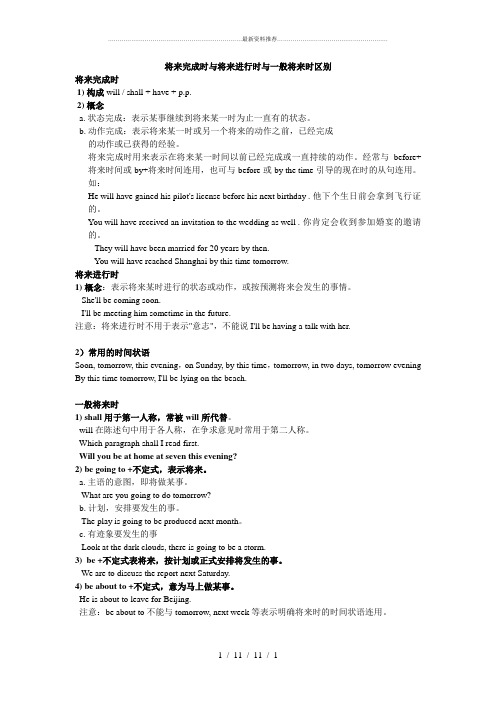
……………………………………………………………最新资料推荐…………………………………………………将来完成时与将来进行时与一般将来时区别将来完成时1) 构成will / shall + have + p.p.2) 概念a. 状态完成:表示某事继续到将来某一时为止一直有的状态。
b. 动作完成:表示将来某一时或另一个将来的动作之前,已经完成的动作或已获得的经验。
将来完成时用来表示在将来某一时间以前已经完成或一直持续的动作。
经常与before+将来时间或by+将来时间连用,也可与before或by the time引导的现在时的从句连用。
如:He will have gained his pilot's license before his next birthday . 他下个生日前会拿到飞行证的。
You will have received an invitation to the wedding as well . 你肯定会收到参加婚宴的邀请的。
They will have been married for 20 years by then.You will have reached Shanghai by this time tomorrow.将来进行时1) 概念:表示将来某时进行的状态或动作,或按预测将来会发生的事情。
She'll be coming soon.I'll be meeting him sometime in the future.注意:将来进行时不用于表示"意志",不能说 I'll be having a talk with her.2)常用的时间状语Soon, tomorrow, this evening,on Sunday, by this time,tomorrow, in two days, tomorrow evening By this time tomorrow, I'll be lying on the beach.一般将来时1) shall用于第一人称,常被will 所代替。
将来时的各种形式及例句整理

将来时的各种形式及例句整理将来时是英语中用来表示将来动作或状态的一种时态,包含了多种形式。
在本文中,将介绍将来时的各种形式并提供相应的例句。
一、一般将来时一般将来时表示将来某个时间会发生的动作或状态。
一般将来时的构成方式如下:1. 主语 + will + 动词原形2. 主语 + be going to + 动词原形以下是一些例句:1. I will go to the movies tomorrow.(我明天会去看电影。
)2. They are going to have a party next week.(他们下周要开派对。
)3. She will learn to play the piano.(她将学会弹钢琴。
)二、将来进行时将来进行时表示将来某一时刻正在进行的动作。
将来进行时的构成方式如下:1. 主语 + will be + 动词ing以下是一些例句:1. They will be watching a movie at this time tomorrow.(明天此时他们将在看电影。
)2. She will be working on her project tomorrow morning.(明天早上她将在进行项目工作。
)三、将来完成时将来完成时表示将来某一时刻之前已经完成的动作。
将来完成时的构成方式如下:1. 主语 + will have + 过去分词以下是一些例句:1. By the time he arrives, I will have finished my homework.(等他到达时,我将已经完成作业。
)2. They will have left for Paris by the end of this month.(到本月末,他们将已经去巴黎了。
)四、将来完成进行时将来完成进行时表示将来某一时刻之前已经开始并且一直在进行的动作。
将来完成进行时的构成方式如下:1. 主语 + will have been + 动词ing以下是一些例句:1. By the time they arrive, we will have been waiting for three hours.(等他们到达时,我们将已经等待了三个小时。
英语的将来时态的用法

英语的将来时态主要用于描述将来某个时间将要发生的动作或存在的状态,或者表达将来经常或反复发生的动作。
以下是几种常见的将来时态及其用法:1、将来简单时(Simple Future Tense):形式:will + 动词原形用法:表示将来某个时间将要发生的动作或状态,或者根据当前情况预测将来会发生的事情。
例子:I will go to the park tomorrow.(我明天会去公园。
)2、将来进行时(Future Continuous Tense):形式:will be + 动词-ing用法:表示将来某个时间正在进行的动作,或者按计划、安排将来要进行的动作。
例子:She will be studying in France next year.(她明年将在法国学习。
)3、将来完成时(Future Perfect Tense):形式:will have + 过去分词用法:表示将来某个时间之前已经完成的动作或状态,或者到将来某个时间为止将要完成的动作。
例子:By the end of next month, we will have finished the project.(到下个月底,我们将完成这个项目。
)4、将来完成进行时(Future Perfect Continuous Tense):形式:will have been + 动词-ing用法:表示到将来某个时间为止一直在进行的动作,或者强调动作的持续性和未完成性。
例子:By the time you arrive, they will have been waiting for you for hours.(到你到达的时候,他们已经等了你几个小时了。
)除了上述常见的将来时态,还有一些其他形式,如“be going t o + 动词原形”也可以表示将来时态,常用于口语和非正式文体中。
需要注意的是,将来时态的具体使用还受到语境、时态呼应和习惯用法等因素的影响。
(完整版)将来完成时_将来进行时

Future Tenses将来时
Objectives
By the end of this class, you will be able to
1. use the future tenses; 2. distinguish the difference between future
Catharine will be taking a parttime job in the next summer vocation.
Complete these predictions about the world in 2020 by putting the verbs in brackets either in the Future Perfect or the Future Continuous.
表示动作或者状态延续到将来某一时 间为止已有若干时间, 谓语动词常用延 续性动词, 并常伴有for引导的时间段。
By the end of next year I will have lived here for ten ygin at 8:00. It will have been shown for half an hour when you arrive at 8:30.
When you come back, I will have been here for half an hour.
表示动作或者状态在将来某个时间之 前完成, 常与by the time, when, before 等连用。谓语动词常用非延续性动词。
I shall have graduated from university by this time next year.
表示将来的几种时态

使用情态动词来表示对未来的预测 或估计,例如“It will rain tomorrow.”(明天会下雨。)
与其他时态的区别
与现在时态的区别
现在时态描述当前正在发 生的事件,而情态动词表 示将来则描述未来的情况 或预测。
与过去时态的区别
过去时态描述过去发生的 事件,而情态动词表示将 来则描述未来的情况或预 测。
与过去进行时区别
过去进行时表示过去某一 时刻正在进行的动作,而 将来进行时表示将来的某 个时间正在进行的动作。
03 将来完成时
定义
01
将来完成时表示在将来某个时间 点之前已经完成的动作或状态。
02
这个时态强调动作或状态在未来 的某个时间点之前已经结束,并 对那个时间点之后的情况产生影 响。
用法
表示将来的几种时态
目录
CONTENTS
• 现在进行时表示将来 • 将来进行时 • 将来完成时 • 情态动词表示将来 • 将来时态的特殊用法
01 现在进行时表示将来
定义
定义
现在进行时表示将来,是指动作 或状态在将来发生或存在,但说 话人强调动作或状态正在进行或
即将开始。
结构
be动词(am/is/are)+动词ing 形式。
计划和安排
当计划在将来某个时间点之前完成某个动作或达到某种状 态时,可以使用将来完成时。例如:“我将在明天之前完 成这项工作。”
预测和期望
当基于现有信息预测将来某个时间点之前已经发生或完成 的情况时,可以使用将来完成时。例如:“到今年年底, 该公司预计将完成新产品的研发。”
条件和假设
在描述假设或条件下的动作或状态时,可以使用将来完成 时。例如:“如果明天下雨,比赛将被取消。”
- 1、下载文档前请自行甄别文档内容的完整性,平台不提供额外的编辑、内容补充、找答案等附加服务。
- 2、"仅部分预览"的文档,不可在线预览部分如存在完整性等问题,可反馈申请退款(可完整预览的文档不适用该条件!)。
- 3、如文档侵犯您的权益,请联系客服反馈,我们会尽快为您处理(人工客服工作时间:9:00-18:30)。
将来完成时练习题1. By the end of this year ,I ____enough money for a holiday.( C )A will saveB will be savingC will have savedD have saved2. I have been studying here for four years,by next summer _D___-.A shall graduateB shall be graduatedC shall be graduatingD shall have graduated3. I hope her health _______greatly by the time we come back next year.( D )A improvesB improvedC will be improvedD will have improve4. “Are yougoing to Richard”s birthday party?‘“Yes.By then I ______my homework..” ( C )A had finishedB will have finishedC would have finishedD finished5. I suppose by the time I come back in ten years’ time all these old house______down.( A )A will have been pulledB will be pullingC will have pulledD will be pulled6. I hope that they _A_____the road by the time we come back.A will have repairedB would have repairedC have repairedD had repaired1.选C,by the end of this year, 是明确表示将来的时间状语,主句表示在这个将来时间以前完成的动作,故应用将来完成时.2.选D.by next summer是明确表示将来的时间状语, 主句表示在这个将来时间以前完成的动作,故应用将来完成时.3.选D,by the time 引出的是时间状语分句,分句中用的come用一般现在时,表示将来概念,相当于一个表示将来的时间状语,主句谓语动词表示在将来某一时刻以前必定完成的行为,应该用将来完成时.不能选A,句子中带有表示将来时间的状语分句,故应该用与将来时相关的时态.也不能选C ,improve 在该句中作”好转”,”变得更好”解,为不及物动词,所以用被动语态时错误的.4.B5.A6.A将来完成时讲义定义将来完成时用来表示在将来某一时间以前已经完成或一直持续的动作。
经常与before+将来时间或by+将来时间连用,也可与before或by the time引导的现在时的从句连用。
构成(shall)will+have+动词过去分词实例a. 状态完成:表示某事继续到将来某一时为止一直有的状态。
b. 动作完成:表示将来某一时或另一个将来的动作之前,已经完成的动作或已获得的经验。
They will have been married for 20 years by then.You will have reached Shanghai by this time tomorrow.将来完成时的构成将来完成时的构成是由"shall/will + have +过去分词"构成的。
Before long he will have forgotten all about the matter.不久他就会全然忘记这件事的。
He is somebody now. He will not have remembered his old classmates.他现在是一个有身份的人了,他可能不会记得老同学了。
Will you have known Kevin for 10 years next month?到下个月你认识凯文该有10年了吧?将来完成时的用法①表示在将来某一时间之前已完成的动作,并往往对将来某一时间产生影响。
We shall have learned 12 units by the end of this term.到这个学期末,我们将学完12个单元。
By the time you get home I will have cleaned the house from top to bottom.你到家之前我将把房子彻底打扫一遍。
②表示推测,相当于"must have done"结构。
You will have heard of this, I guess.我想你已经听说过这件事了。
I am sure he will have got the information.我相信他一定得到了这个信息③.表示某种状态一直持续到说话人所提及的时间we will have been married a year on june 25th到6月25日我们俩结婚就满1年了简介将来进行时主要表示将来某一时间正在进行的动作,或表示要在将来某一时将来进行时间开始,并继续下去的动作。
常用来表示礼貌的询问、请求等。
如:This time next day they will be sitting in the cinema. 将来进行时常用的时间状语Soon, tomorrow, this evening,on Sunday, by this time,tomorrow, in two days, tomorrow evening,By this time tomorrow, I'll be lying on the beach. 等等。
语法构成将来进行时是由"shall/will + be + 现在分词"构成的Don't phone me between 8:00 and 10:00. We'll be having classes then.8点到10点之间不要给我打电话,我们那时正在上课。
Will you be using your bicycle this evening?今晚你用自行车吗?形式分类将来进行时由“动词be的将来时+现在分词”构成,具体形式见下表:从人称上分从语态上分A.基本用法表示在将来某一时间正在进行的动作。
The minister will be giving a speech on international affairs.部长将就国际事务发表演讲。
B.特殊用法表示原因、结果或猜测。
Please come tomorrow afternoon, Tomorrow morning I'll be having a meeting.请你明天下午来吧。
我明天上午有个会。
(表原因)Stop the child or he will be falling over.抓住那个孩子,要不他会掉下去的。
(表结果)You will be making a mistake.你会出错的。
(表推测)用在问句中,表示委婉礼貌My duties will end in July and I will be returning to Shanghai.我的任务在7月结束,之后我会回上海。
用法详例(1)表示将来某一时间正在进行的动作,一般带状语。
When he comes to my house tomorrow, I will be writing the report.(2)表示现在正在进行的动作,但这个动作会延续到将来。
I think that she will be working on this experiment until next morning.(3)表示预定的将来动作或对将来的预测。
After you take the medicine, you will be feeling much better.(4)表示委婉的请求When shall we be meeting again.(5)表示原因Please come torrow afternoon tomorrow morning,I'll be having a meeting.(6)表示结果Stop the child or he will be falling over.(7)表示对将来的打算(区别于对将来的预测)My duties will end in July , and I'll be returning to ShangHai.语法区别A.与现在进行时态的区别现在进行时表示一种经过考虑的,将来要进行的动作,而将来进行时通常表示正常过程中会发生的动作,因此将来进行时不如现在进行时那样肯定,比后者偶然性要大一些:I am seeing Tom tomorrow. 明天我要和汤姆见面.I'll be seeing Tom tomorrow. 明天我会见到汤姆.第一句意指汤姆或说话人已经特意安排了这次会面,而第二句则意指汤姆和说话人将在通常进程中见面(也许他们在一起工作).不过这种差别并不是在任何情况下都很重要,而且常常两者都可以使用.现在进行时用于表示最近将来的动作时,必须有确定的时间,而将来进行时可以和确定的时间状语连用,也可以不连用.它既可以表示最近将来的动作,也可以表示较远将来的动作.可以说:I am meeting him tomorrow. 我明天和他会面.B.与一般将来时态的区别将来进行时通常表示的是对将来事实的简单陈述.而will+V. (一般将来时)除表示时间概念外,还带有感情色彩.e.g. 汤姆明天将正在割草. Tom will be cutting grass tomorrow.汤姆明天愿意割草. Tom will cut the grass tomorrow.。
